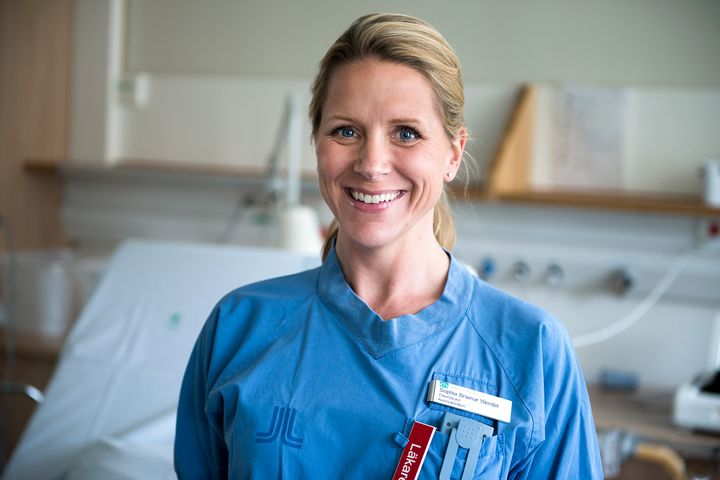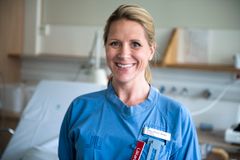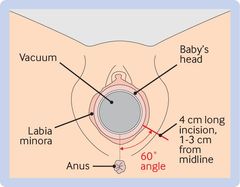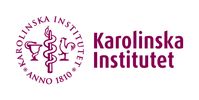Perineal cut reduces the risk of serious birth injury
In first-time mothers requiring vacuum-assisted delivery, a lateral episiotomy (angled cut) in the tissue between the vaginal and anal opening more than halves the risk of obstetric anal sphincter injury, a severe form of perineal trauma between the vulva and anus. This according to a randomised clinical study led by researchers at Karolinska Institutet and Stockholm’s Danderyd Hospital, the results of which are published in The BMJ.

Obstetric Anal Sphincter Injury (OASI), which involves the anal sphincter muscles, can lead to anal incontinence with difficulties retaining gas and faeces. It can also cause sexual problems and impair quality of life. This serious form of perineal injury affects around five per cent of all first-time mothers in Sweden who have a vaginal birth.
”Women giving birth for the first time and requiring instrumental birth are at the highest risk of sustaining OASI,” says Sophia Brismar Wendel, associate professor in obstetrics and gynaecology at the Department of Clinical Sciences, Danderyd Hospital, Karolinska Institutet and senior consultant at the Department of Women's Health, Danderyd Hospital. ”Therefore, we wanted to assess if such injury could be prevented in this group with a lateral episiotomy (angled cut in the perineum) when the baby's head is crowning.”
Participants were recruited to the EVA (Episiotomy in Vacuum Assisted delivery) trial at eight Swedish hospitals between 2017 and 2023. Over 6 100 pregnant women expecting their first child agreed to take part if the delivery required vacuum assistance. A total of 702 women with a vacuum assisted delivery were randomly assigned to receive a lateral episiotomy or no episiotomy.
The lateral episiotomy reduced the risk of OASI by an average of 53 per cent. Among the women assigned to the procedure, 6.1 per cent sustained an OASI, compared to 13.1 per cent in the comparison group. Moreover, the procedure did not increase the risk of severe blood loss, negative birth experience, prolonged hospitalisation or additional complications. However, the risk of wound complications such as wound infection and wound dehiscence was increased in the episiotomy group.
”Episiotomy as a medical intervention is controversial as it has historically also been used for normal births, sometimes without the woman's consent,” says Sophia Brismar Wendel. ”The use of episiotomy is highly variable in different countries, and in Sweden we've practised restrictive use given the lack of evidence. However, these results may impact obstetric care both in Sweden and elsewhere.”
The trial is also gathering data on the women's self-reported symptoms at one and five years after childbirth. The results from the one-year follow-up will soon be analysed, which might give some answers about any differences in symptoms, such as anal incontinence and sexual function.
”This may help doctors and pregnant women in shared informed decision-making regarding the use of a prophylactic lateral episiotomy,” says Sophia Brismar Wendel.
The hospitals participating in the EVA study are the University Hospital of Umeå, Falun Hospital, Uppsala University Hospital, Danderyd Hospital, Stockholm South General (Söder) Hospital, Växjö Central Hospital, Sahlgrenska University Hospital - Östra, and Helsingborg Hospital. The study was primarily financed by the Swedish Research Council, Region Stockholm and the Uppsala-Örebro Regional Research Council. There are no reported conflicts of interest.
Publication: ”Lateral episiotomy or no episiotomy in vacuum assisted delivery in nulliparous women (EVA): multicentre, open label, randomised controlled trial”, Sandra Bergendahl, Maria Jonsson, Susanne Hesselman, Victoria Ankarcrona, Åsa Leijonhufvud, Anna-Carin Wihlbäck, Tove Wallström, Emmie Rydström, Hanna Friberg, Helena Kopp Kallner, Sophia Brismar Wendel, The BMJ, online 17 June 2024, doi: 10.1136/bmj-2023-079014.
Editorial about the study: ”Lateral episiotomy during vacuum assisted childbirth”
Contacts
For more information, please contact:
Sophia Brismar Wendel, associate professor, senior consultant
Department of Clinical Sciences, Danderyd Hospital, Karolinska Institutet
Department of Women’s Health, Danderyd Hospital
Email: sophia.brismar@ki.se
Phone: +46 722 024895
Images


Karolinska Institutet (https://ki.se/en) is one of the world’s leading medical universities. Our vision is to advance knowledge about life and strive towards better health for all. Karolinska Institutet accounts for the single largest share of all academic medical research conducted in Sweden and offers the country’s broadest range of education in medicine and health sciences. The Nobel Assembly at Karolinska Institutet selects the Nobel laureates in Physiology or Medicine.
Subscribe to releases from Karolinska Institutet - English
Subscribe to all the latest releases from Karolinska Institutet - English by registering your e-mail address below. You can unsubscribe at any time.
Latest releases from Karolinska Institutet - English
Women who suffer pregnancy complications have fewer children25.11.2024 17:00:00 CET | Pressmeddelande
Women who suffer severe complications during their first pregnancy or delivery are less inclined to have more babies, a study published in JAMA by researchers at Karolinska Institutet reports. Given the recent steady decline in birth rate in Sweden, the researchers propose monitoring in antenatal care to address the problem.
Very early medication abortion is effective and safe6.11.2024 23:00:00 CET | Pressmeddelande
Clinics and hospitals currently defer medication abortion until ultrasound confirms a pregnancy inside the uterus. However, a large international study led by researchers from Karolinska Institutet now indicates that treatment can be equally effective and safe even before the sixth week of pregnancy. The study is published in The New England Journal of Medicine.
The 2024 Nobel Prize in Physiology or Medicine jointly to Victor Ambros and Gary Ruvkun7.10.2024 12:15:58 CEST | Press Release
The Nobel Assembly at Karolinska Institutet has today decided to award the 2024 Nobel Prize in Physiology or Medicine jointly to Victor Ambros and Gary Ruvkun for the discovery of microRNA and its role in post-transcriptional gene regulation.
Announcement of the Nobel Prize in Physiology or Medicine 202426.9.2024 17:00:00 CEST | Pressinbjudan
The Nobel Prize will be announced on Monday 7 October 2024 at 11.30 am (at the earliest).The announcement will be open only for media representatives who have been accredited in advance.
Breaking the trend: Skin cancer incidence in young adults declines9.9.2024 00:05:00 CEST | Pressmeddelande
The risk of skin cancer for adults under the age of 50 is now decreasing for the first time in Sweden, according to a study from Karolinska Institutet published in JAMA Dermatology.
In our pressroom you can read all our latest releases, find our press contacts, images, documents and other relevant information about us.
Visit our pressroom